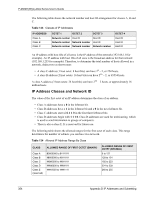ZyXEL P-2602HW-D3A User Guide - Page 357
Example: Four Subnets
 |
View all ZyXEL P-2602HW-D3A manuals
Add to My Manuals
Save this manual to your list of manuals |
Page 357 highlights
P-2602H(W)(L)-DxA Series User's Guide Table 138 Subnet 1 (continued) IP/SUBNET MASK Subnet Address: 192.168.1.0 Broadcast Address: 192.168.1.127 NETWORK NUMBER Lowest Host ID: 192.168.1.1 Highest Host ID: 192.168.1.126 LAST OCTET BIT VALUE Table 139 Subnet 2 IP/SUBNET MASK IP Address IP Address (Binary) Subnet Mask Subnet Mask (Binary) Subnet Address: 192.168.1.128 Broadcast Address: 192.168.1.255 NETWORK NUMBER 192.168.1. 11000000.10101000.00000001. 255.255.255. 11111111.11111111.11111111. Lowest Host ID: 192.168.1.129 Highest Host ID: 192.168.1.254 LAST OCTET BIT VALUE 128 10000000 128 10000000 Host IDs of all zeros represent the subnet itself and host IDs of all ones are the broadcast address for that subnet, so the actual number of hosts available on each subnet in the example above is 27 - 2 or 126 hosts for each subnet. 192.168.1.0 with mask 255.255.255.128 is the subnet itself, and 192.168.1.127 with mask 255.255.255.128 is the directed broadcast address for the first subnet. Therefore, the lowest IP address that can be assigned to an actual host for the first subnet is 192.168.1.1 and the highest is 192.168.1.126. Similarly the host ID range for the second subnet is 192.168.1.129 to 192.168.1.254. Example: Four Subnets The above example illustrated using a 25-bit subnet mask to divide a class "C" address space into two subnets. Similarly to divide a class "C" address into four subnets, you need to "borrow" two host ID bits to give four possible combinations (00, 01, 10 and 11). The subnet mask is 26 bits (11111111.11111111.11111111.11000000) or 255.255.255.192. Each subnet contains 6 host ID bits, giving 26-2 or 62 hosts for each subnet (all zeroes is the subnet itself, all ones is the broadcast address on the subnet). Table 140 Subnet 1 IP/SUBNET MASK IP Address IP Address (Binary) Subnet Mask (Binary) NETWORK NUMBER 192.168.1. 11000000.10101000.00000001. 11111111.11111111.11111111. LAST OCTET BIT VALUE 0 00000000 11000000 Appendix D IP Addresses and Subnetting 357















